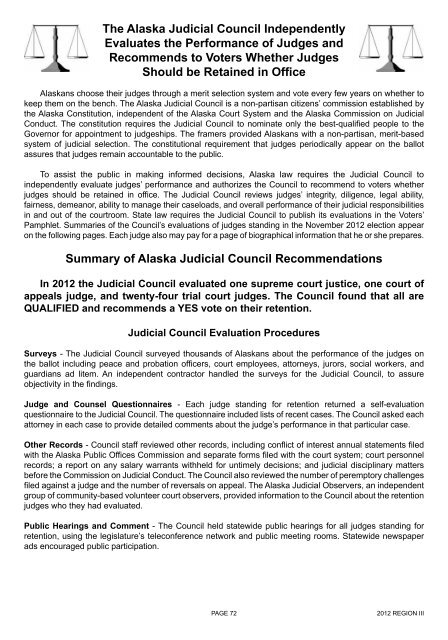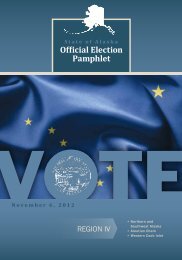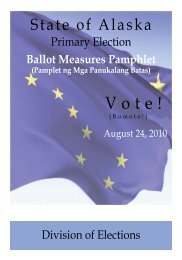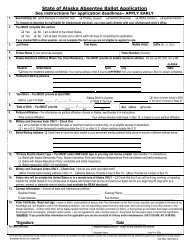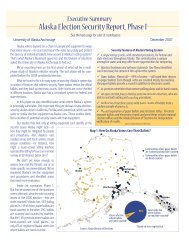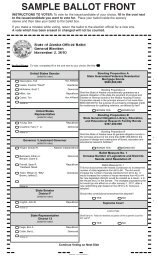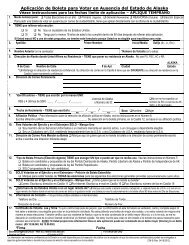Official Election Pamphlet - Alaska Elections State Division of Elections
Official Election Pamphlet - Alaska Elections State Division of Elections
Official Election Pamphlet - Alaska Elections State Division of Elections
You also want an ePaper? Increase the reach of your titles
YUMPU automatically turns print PDFs into web optimized ePapers that Google loves.
The <strong>Alaska</strong> Judicial Council Independently<br />
Evaluates the Performance <strong>of</strong> Judges and<br />
Recommends to Voters Whether Judges<br />
Should be Retained in Office<br />
<strong>Alaska</strong>ns choose their judges through a merit selection system and vote every few years on whether to<br />
keep them on the bench. The <strong>Alaska</strong> Judicial Council is a non-partisan citizens’ commission established by<br />
the <strong>Alaska</strong> Constitution, independent <strong>of</strong> the <strong>Alaska</strong> Court System and the <strong>Alaska</strong> Commission on Judicial<br />
Conduct. The constitution requires the Judicial Council to nominate only the best-qualified people to the<br />
Governor for appointment to judgeships. The framers provided <strong>Alaska</strong>ns with a non-partisan, merit-based<br />
system <strong>of</strong> judicial selection. The constitutional requirement that judges periodically appear on the ballot<br />
assures that judges remain accountable to the public.<br />
To assist the public in making informed decisions, <strong>Alaska</strong> law requires the Judicial Council to<br />
independently evaluate judges’ performance and authorizes the Council to recommend to voters whether<br />
judges should be retained in <strong>of</strong>fice. The Judicial Council reviews judges’ integrity, diligence, legal ability,<br />
fairness, demeanor, ability to manage their caseloads, and overall performance <strong>of</strong> their judicial responsibilities<br />
in and out <strong>of</strong> the courtroom. <strong>State</strong> law requires the Judicial Council to publish its evaluations in the Voters’<br />
<strong>Pamphlet</strong>. Summaries <strong>of</strong> the Council’s evaluations <strong>of</strong> judges standing in the November 2012 election appear<br />
on the following pages. Each judge also may pay for a page <strong>of</strong> biographical information that he or she prepares.<br />
Summary <strong>of</strong> <strong>Alaska</strong> Judicial Council Recommendations<br />
In 2012 the Judicial Council evaluated one supreme court justice, one court <strong>of</strong><br />
appeals judge, and twenty-four trial court judges. The Council found that all are<br />
QUALIFIED and recommends a YES vote on their retention.<br />
Judicial Council Evaluation Procedures<br />
Surveys - The Judicial Council surveyed thousands <strong>of</strong> <strong>Alaska</strong>ns about the performance <strong>of</strong> the judges on<br />
the ballot including peace and probation <strong>of</strong>ficers, court employees, attorneys, jurors, social workers, and<br />
guardians ad litem. An independent contractor handled the surveys for the Judicial Council, to assure<br />
objectivity in the findings.<br />
Judge and Counsel Questionnaires - Each judge standing for retention returned a self-evaluation<br />
questionnaire to the Judicial Council. The questionnaire included lists <strong>of</strong> recent cases. The Council asked each<br />
attorney in each case to provide detailed comments about the judge’s performance in that particular case.<br />
Other Records - Council staff reviewed other records, including conflict <strong>of</strong> interest annual statements filed<br />
with the <strong>Alaska</strong> Public Offices Commission and separate forms filed with the court system; court personnel<br />
records; a report on any salary warrants withheld for untimely decisions; and judicial disciplinary matters<br />
before the Commission on Judicial Conduct. The Council also reviewed the number <strong>of</strong> peremptory challenges<br />
filed against a judge and the number <strong>of</strong> reversals on appeal. The <strong>Alaska</strong> Judicial Observers, an independent<br />
group <strong>of</strong> community-based volunteer court observers, provided information to the Council about the retention<br />
judges who they had evaluated.<br />
Public Hearings and Comment - The Council held statewide public hearings for all judges standing for<br />
retention, using the legislature’s teleconference network and public meeting rooms. <strong>State</strong>wide newspaper<br />
ads encouraged public participation.<br />
PAGE 72<br />
2012 REGION III


